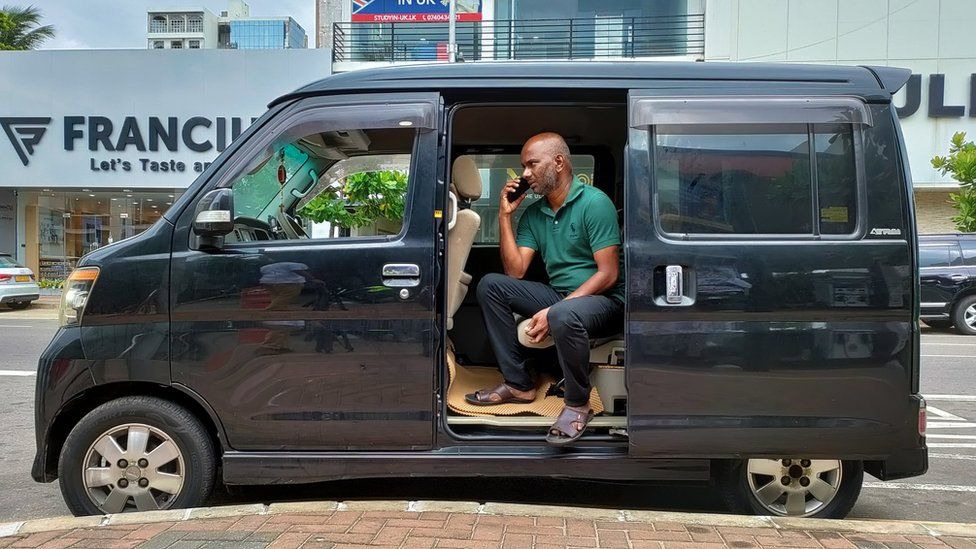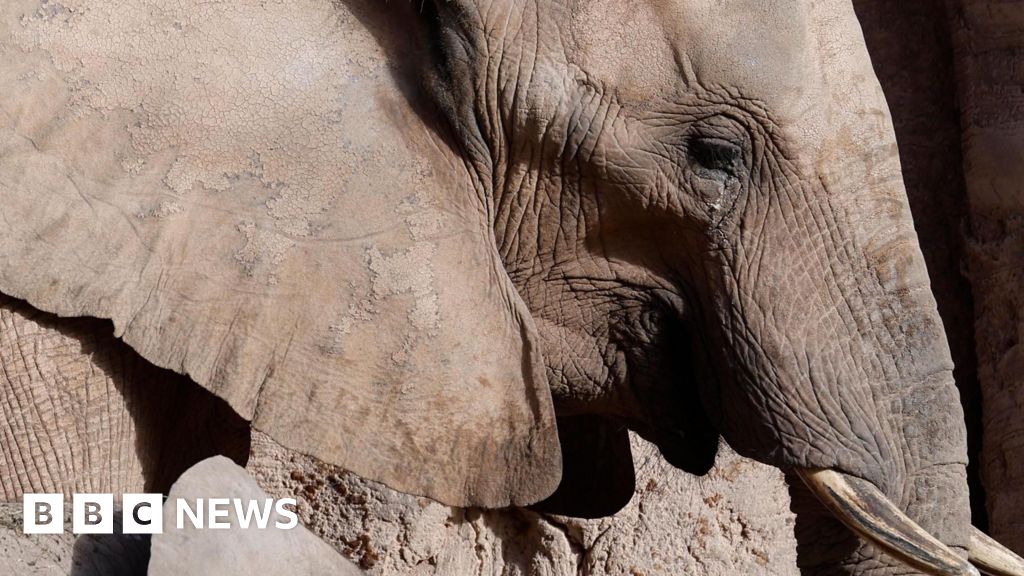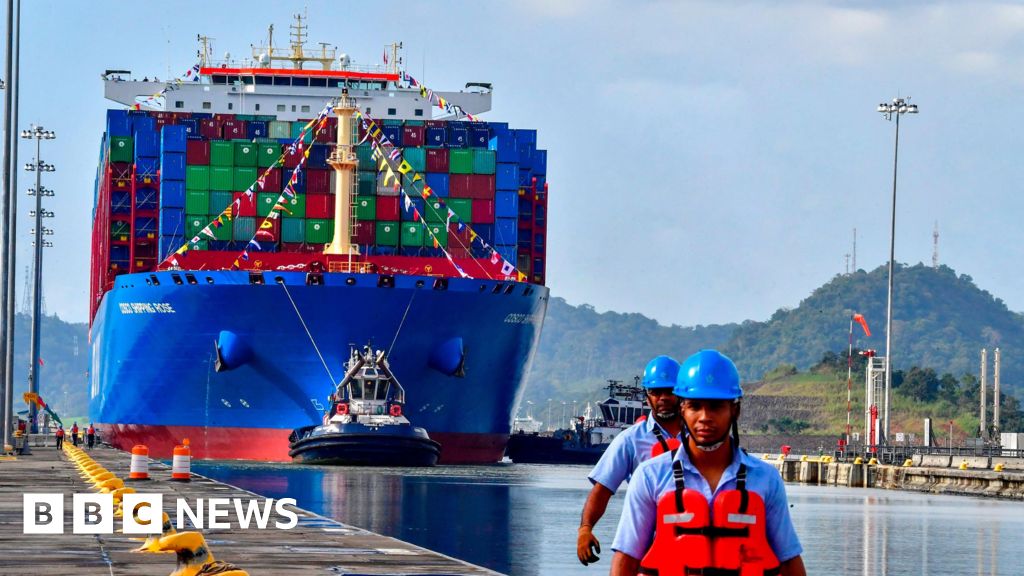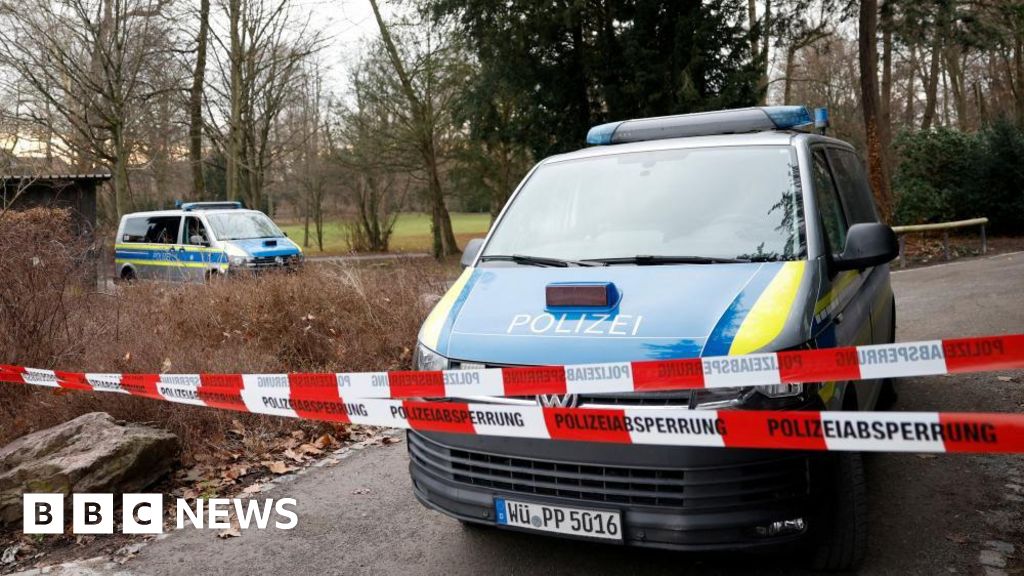ARTICLE AD BOX
By Rajini Vaidyanathan
BBC South Asia correspondent, Colombo

Mr Sadasivam's taxi has become his temporary home as he queues
Being the first in the queue is usually a coveted spot, but Ajeewan Sadasivam has no idea how long he'll be stuck in this one.
"I've been in line for two days already," he says, as he waits patiently outside a petrol station in the capital Colombo.
As a taxi driver, fuel is his lifeblood, but Sri Lanka has no fresh supplies of petrol coming in.
Mr Sadasivam shows us the petrol gauge on his dashboard, the arrow hovering at empty.
"I have been sleeping in this car. Sometimes I leave to go and get food, then I come back and wait… I haven't bathed in days."
He says he has no choice but to wait it out: "I have to look after my family, my wife and two children… only if there's fuel can I start running my cab and make a living."
With no international shipments of fuel coming in for at least two weeks, supplies are being sent to the capital from other parts of the island, where there are still some reserves.
But the island nation runs low on supplies.
Mr Sadasivam is hopeful a tanker will arrive soon. As he stares out at the station forecourt, members of Sri Lanka's military stroll up and down, guarding the empty pumps.
"They've told me they're expecting a vehicle to reach tonight," he says with a hint of optimism.
"I have to wait, even if it takes a week. I can't go to another queue. It's not practical."
Mile-long queues have sprouted up amid the competition for scarce supplies
Mr Sadasivam is hardly alone - the lines for fuel snake along the main road, weaving down along adjoining side streets stretching for close to 2km (1.2 miles) along the oceanfront.
It's a striking sight - four parallel queues. One for cars, one for buses and trucks, another two for motorbikes and tuk-tuks.
It's a double whammy of a wait. Before anyone can get any fuel - whenever it arrives - they need to be issued a token.
Those we talked to say most petrol stations are only issuing around 150 tokens at a time.
Right at the back of the queue, we find Jayantha Athukorala who's travelled from a village outside Colombo, expending at least 12 litres of petrol just to take a chance on finding more.
Unlike Mr Sadasivam, Mr Athukorala doesn't have a token - by his best guess he's at number 300 in line.
Mr Athukorala is a car salesman by trade - but now is hunting for fuel like everyone else
"I'm not sure I'll get a token today," he says despondently. "We cannot live without gas or petrol. We're in deep trouble."
A car salesman, he's now forced to sleep in his own car as he waits it out.
While some fuel stations are only supplying to essential services like healthcare, food distribution and public transport, others are allowing members of the public to get some - under a strict rationing scheme.
Mr Athukorala says the allocated amount for cars - worth 10,000 Sri Lankan rupees ($28; £22) - will barely fill up half a tank.
With pressure on Sri Lanka's government to find sources of fuel, the government has reached out to Russia for help. A delegation is due to arrive in Moscow at the weekend, to discuss the purchase of cheap oil, and president Gotabaya Rajapaksa has written to Vladimir Putin to discuss the issue.
Passing by the fuel station, we meet Jagannathan, who has resorted to other means to get around.
With a big smile on his face, he shows us his newly-purchased bike, which still has some plastic wrapping on it.
"I'm still getting used to it," he says as he fiddles with the pedals.
Jagannathan paid over the odds for his new orange bike - but is back on the move
Jagannathan used to work as a driver too - but with no petrol or diesel, he's stopped working, and spent some of his savings on the bike.
He said he paid more than three times the usual price for his wheels - 70,000 LKR ($194; £160)
As Jagannathan rides away on his new purchase, we meet others trying their luck in other ways too.
Behind a queue of stationary tuk-tuks, there's a much smaller line - a group of half a dozen people waiting to buy a lottery ticket.
It moves fast, until Siri, a labourer who survives on odd jobs, buys up the remaining tickets on sale - all 26 of them.
Siri, like many others, is hoping for a stroke of luck
Siri says he's bought the tickets for his family: "I have no source of income, it's hard but we have to be patient."
While some in the fuel queue sleep in their tuk-tuks and others form groups and chat to while away the time, Siri looks down at the pile of tickets in his hand.
"Maybe someday I'll win the lottery," he says, with a lot more hope than most here.
Additional reporting by Andrew Clarance

 2 years ago
29
2 years ago
29








 English (US) ·
English (US) ·